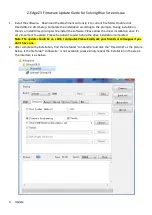
98
OTHER RECORDING FUNCTIONS
• When the histogram is too far
to the right, it means that
there are too many light
pixels.
This type of histogram results
when the overall image is
light. A histogram that is too
far to the right may result in
“white out” of the light areas of
an image.
• A centered histogram
indicates that there is good
distribution of light pixels and
dark pixels. This type of
histogram results when the
overall image is at optimal
lightness.
• An RGB histogram that shows the distribution of R (red) ,
G (green) , and B (blue) components is also displayed.
This histogram can be used to determine whether there is
too much or too little of each of the color components in
an image.
NOTE
• You can use key customization (page 104) to
configure the camera to perform exposure
compensation whenever you press [
] or [
] while in
a REC mode. If you do this, you can adjust exposure
compensation while viewing the on-screen histogram
(page 76).
• When the histogram is too far
to the left, it means that there
are too many dark pixels.
This type of histogram results
when the overall image is
dark. A histogram that is too
far to the left may result in
“black out” of the dark areas
of an image.
















































